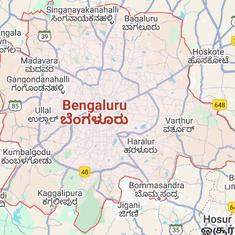Parliament: Lok Sabha adjourned for the day, Speaker suspends AIADMK and TDP members
Members of both parties protested in the Well of the House and were suspended for repeatedly disrupting proceedings.

The Lok Sabha on Thursday was adjourned for the day after members of the All India Anna Dravida Munnetra Kazhagam and Telugu Desam Party continued their protests over a range of issues. Speaker Sumitra Mahajan suspended members of both parties for four days for repeatedly disrupting proceedings, PTI reported.
Mahajan suspended the 21 MPs under rule 374(A), which allows the Speaker to punish those causing chaos in the House, ANI reported. The Tamil Nadu MPs have been protesting against the construction of a dam on the Cauvery river, while TDP members have been demanding special category status for Andhra Pradesh.
Among those suspended were TDP leader and former civil aviation minister Ashok Gajapathi Raju and party MP Thota Narasimham.
Mahajan had on Wednesday suspended 24 AIADMK members for repeatedly entering the Well of the House to protest on the Cauvery matter. The party has 37 members in the Lower House. On Thursday, seven AIADMK members again protested in the Well by shouting slogans and flinging piece of paper in the air. They were joined by over a dozen Telugu Desam Party MPs, leading to chaos in the House.
Mahajan initially adjourned the proceedings till noon. Later, she adjourned the Lower House till 2 pm after members refused to call off their protests.
Several adjournment motions were moved in the Lok Sabha on Thursday. Congress leaders Mallikarjun Kharge, Jyotiraditya Scindia, Sunil Kumar Jakhar and Rajiv Satav moved an adjournment motion over an order that allowed 10 central agencies to monitor computers, ANI reported. Congress leader KC Venugopal and Suresh Kodikunnil and Indian Union Muslim League leader PK Kunhalikutty moved a motion over the entry of women to the Sabarimala shrine in Kerala, ANI reported.
Rashtriya Janata Dal MP JP Yadav also moved an adjournment motion over the eradication of the Ahir or Yadav regiment from the Indian Army.
The Aadhaar and Other Laws (Amendment) Bill was discussed in the Lok Sabha, a day after Union Law Minister Ravi Shankar Prasad introduced it. The Union Cabinet in December had approved amendments to two laws – Telegraph Act and the Prevention of Money Laundering Act – to make it optional to link biometric identification Aadhaar with bank accounts and mobile numbers. The opposition on Wednesday had asked Parliament to reconsider the bill tabled by Prasad, arguing that it violated the Supreme Court verdict.
The other bills up for discussion in the Lower House include the Companies (Amendment) Bill, the Personal Laws (Amendment) Bill, and the National Medical Commission Bill.
Rajya Sabha
Proceedings in the Rajya Sabha started with a discussion on the Cauvery water dispute, with AIADMK MPs protesting outside the Parliament in the morning, The Indian Express reported.
The Upper House passed the Right of Children to Free and Compulsory Education Amendment Bill, 2019, and the National Council for Teacher Education Amendment Bill, 2018.
During the afternoon session, AIADMK MP A Navneethakrishnan, who chairperson Venkaiah Naidu had asked to leave the House on Wednesday, protested that the move was “undemocratic”, The Hindu reported. Dravida Munnetra Kazhagam MP Kanimozhi also asked the chair for permission to speak.
The House also discussed and approved the imposition of President’s rule in Jammu and Kashmir. Home Minister Rajnath Singh said the government was ready to hold Assembly elections in the state along with the General Elections if the Election Commission wants to.
Senior Congress leader Ghulam Nabi Azad spoke about terrorism and employment in the state, The Indian Express reported. Responding to his allegations that the situation in the state had deteriorated in the last four-and-a-half years, Union Finance Minister Arun Jaitley said that the opposition party had ruled Kashmir through undemocratic means.
“Congress ruled Jammu and Kashmir using undemocratic means and the party had manipulated the election processes in the state to stay in power,” Jaitley said. “Congress’s mistakes are hurting Kashmir, not the recent rule of the BJP.”









